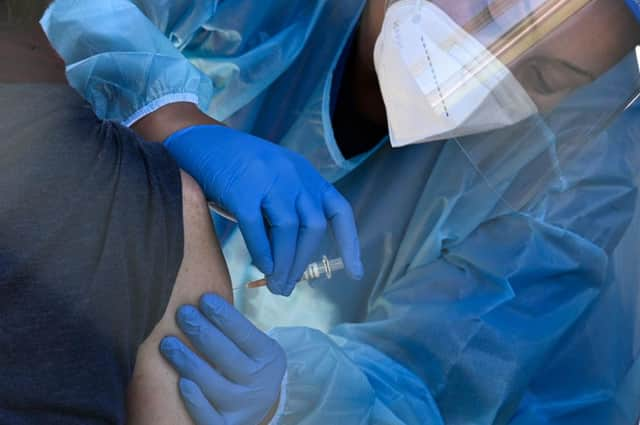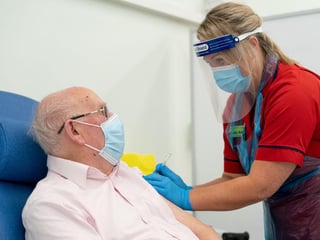Can vaccinated people spread Covid? How the coronavirus vaccine works - and if it prevents the spread of virus


More than six million people in the UK have received at least one dose of the coronavirus vaccine.
The jab rollout is well underway, with people being offered either the Pfizer-BioNTech vaccine or Oxford-AstraZeneca jab.
Advertisement
Hide AdAdvertisement
Hide AdModerna’s recently-approved vaccine is also due to arrive in the UK in spring.
Yet how effective the vaccine is in preventing people from passing the virus onto someone else has been unknown since the first one was approved.
However, England’s deputy chief medical officer Jonathan Van-Tam has now warned that those who have been given a jab could still spread infection.
Here’s everything you need to know.
Can you spread the virus if you’ve been vaccinated?
Professor Van-Tam has said the vaccines may not fully prevent you from passing coronavirus onto others.
Advertisement
Hide AdAdvertisement
Hide AdWriting in the Telegraph, the deputy chief medical officer said scientists still “do not yet know the impact of the vaccine on transmission”.
But he warned people that even after they have been fully inoculated, they may still give the virus to someone else.
He wrote: “Even after you have had both doses of the vaccine you may still give Covid to someone else and the chains of transmission will then continue.”
Prof Van-Tam added that protection could take up to three weeks to kick in after someone has been given the injection.
Advertisement
Hide AdAdvertisement
Hide AdAlthough people who have received a jab could still infect others, the government has said it still expects this risk to be reduced.
Can you still become ill after your jab?
As it takes a few weeks for immunity to build up after receiving the vaccine, there is still a chance that you could catch Covid-19 in that time.
Furthermore, those who have only received one dose of the jab are less protected than those who have had both.
Even if you have been given both doses, the government has said you could still contract the virus - but your chances of getting extremely ill will be reduced.
Advertisement
Hide AdAdvertisement
Hide AdStudies of the vaccines also showed that people appeared far less likely to become really ill after being given the second dose.
Professor Van-Tam reminded the public that no vaccine “has ever been 100 per cent effective, so no one will have 100 per cent protection from the virus”.
Explaining the science behind the vaccine, he added: “Vaccines work by tricking your body into thinking it has to fight the virus. It trains you for this fight by making antibodies and stimulating T-cells; then you are ready if you do come across the real thing.
“However, like any training, getting up to ‘match fitness’ takes time. Your body’s response, the immune response, is only fully trained up around 2 or 3 weeks after you have each of your 2 jabs. If you are older it’s better to allow at least 3 weeks. You can still get Covid in this time."
Do I have to follow lockdown rules after vaccination?
Advertisement
Hide AdAdvertisement
Hide AdIf you have been inoculated, you still need to follow the current lockdown restrictions to prevent spreading the virus to other people.
Professor Van-Tam said it was “vital” that people follow the restrictions to protect those who have not yet received a jab.
He wrote: "If you change your behaviour you could still be spreading the virus, keeping the number of cases high and putting others at risk who also need their vaccine but are further down the queue.
"Regardless of whether someone has had their vaccination or not, it is vital that everyone follows the national restrictions and public health advice, as protection takes up to three weeks to kick in and we don't yet know the impact of vaccines on transmission.
Advertisement
Hide AdAdvertisement
Hide Ad"The vaccine has brought considerable hope and we are in the final furlong of the pandemic but for now, vaccinated or not, we still have to follow the guidance for a bit longer."
As well as complying with government coronavirus rules, you still need to practise social distancing, wear a face mask and wash your hands frequently if you’ve been given the vaccine.
Once a large portion of the population has been vaccinated, the government hopes that it will be able to ease restrictions and allow people to live more “normal” lives.
